Kayleigh Scott of Denver, Colorado, starred in a United Airlines video in 2020, where she shared her story as a transgender woman
It’s possible that I shall make an ass of myself. But in that case one can always get out of it with a little dialectic. I have, of course, so worded my proposition as to be right either way (K.Marx, Letter to F.Engels on the Indian Mutiny)
Saturday, March 25, 2023
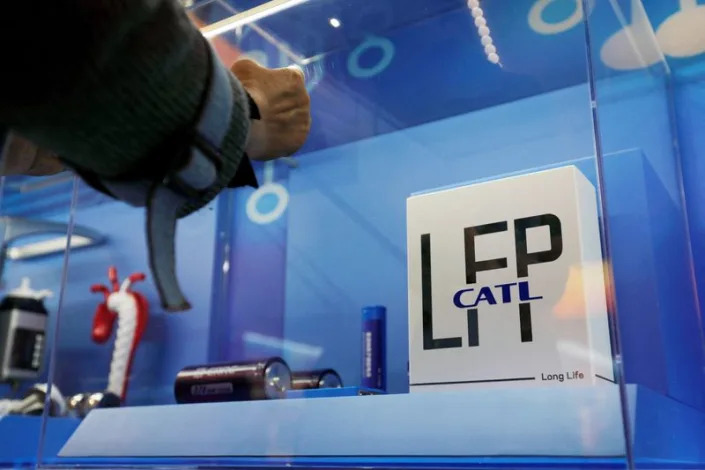
CATL's logo seen at an exhibition
Fri, March 24, 2023
SHANGHAI (Reuters) -Chinese battery giant CATL plans to start this year the mass production and delivery of batteries based on a new materials technology, M3P, which will perform better and cost less than nickel and cobalt-based ones, its chairman said.
M3P batteries will have greater energy density and perform better than lithium-ion phosphate batteries, a market CATL dominates. They will also be cheaper than nickel and cobalt-based batteries, Zeng Yuqun told an online investor briefing on Friday.
CATL disclosed in August last year that it was working on M3P technology, which can enable an electric vehicle to run 700 km (430 miles) per charge when combined with CATL's next generation of battery-pack technology.
Zeng said CATL was finding it difficult to come up with a technologically feasible and competitive product based on solid state batteries, a competing technology that is also being researched by Japan's Toyota Motor Corp and Germany's Volkswagen.
CATL, whose clients include Tesla, Volkswagen, BMW and Ford, is the world's biggest battery maker accounting for more than a third of the sales of batteries for electric vehicles (EV) worldwide.
The company's dominance attracted attention from Chinese President Xi Jinping, who said earlier this month he was both "pleased and concerned" over its rise.
Since last year, a number of CATL's customers have complained about its market position, with some opting for alternative suppliers or choosing to develop their own batteries, Reuters has reported.
Asked on Friday how these rival batteries could affect CATL's market share, Zeng said that he expected them to have more impact on second-tier and third-tier battery-makers and that CATL would remain the primary battery supplier.
He said new energy vehicle sales in China have been recently affected by inventory clearance efforts by combustion engine car makers ahead of a change in emissions rules, but he remained confident about the overall EV sales outlook.
More than 40 brands have slashed vehicle prices in China in recent months, deepening a price war ignited by Tesla's first salvo in January.
(Reporting by Zhang Yan and Brenda Goh; Editing by Barbara Lewis and Muralikumar Anantharaman)
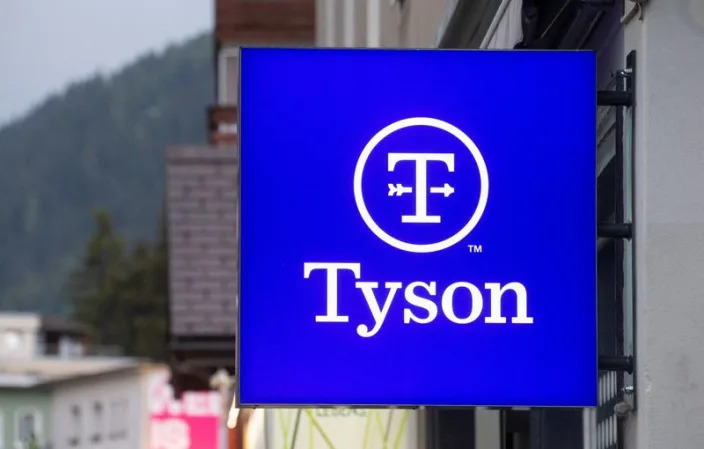
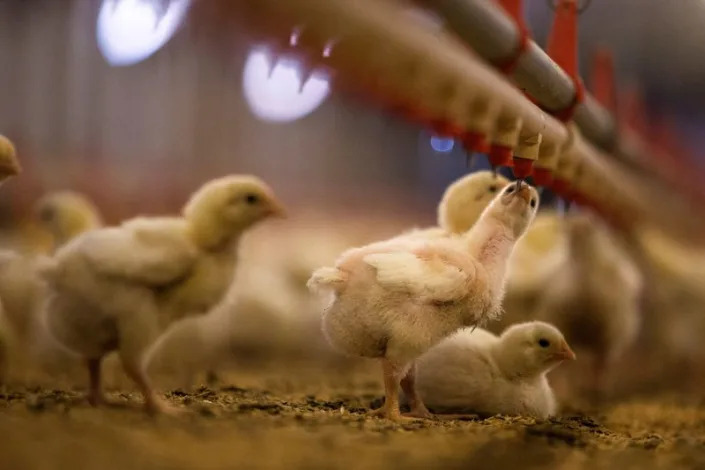
Nine-day-old chicks drink water at a Foster Farms ranch near Turlock
Fri, March 24, 2023
By Leah Douglas and Tom Polansek
(Reuters) -Tyson Foods Inc gave its chicken suppliers two months' notice of its plan to shut a Virginia processing plant in May, raising concerns among farmers and legal experts about the company's compliance with antitrust regulations requiring it to give 90 days' notice before ending a contract.
The planned closure of the plant has left dozens of Virginia chicken growers scrambling to find new buyers in a region with few other options. It could also expose Tyson to fines under the century-old Packers and Stockyards Act (PSA), the U.S. antitrust law requiring the minimum advance warning, according to Peter Carstensen, a professor of law emeritus at the University of Wisconsin-Madison Law School who previously served in the antitrust division at the U.S. Department of Justice.
Tyson told Reuters the company is not canceling any farmers' contracts and instead has committed to paying the growers for the full-term of their remaining contracts, keeping in compliance with federal regulations.
Antitrust issues, particularly in meatpacking, have been a priority for the U.S. Department of Agriculture (USDA) under President Joe Biden, who in 2021 directed federal agencies to tackle consolidation. Four companies, including Tyson, control 55% to 85% of the beef, pork, and chicken markets.
Tyson alerted Virginia farmers by phone on March 13 and later by mail that it will shut its Glen Allen plant on May 12, according to three poultry farmers who supply the plant. The company said there are 55 farmers with 73 contracts who supply the plant with chickens raised for meat.
Tyson owns chickens it slaughters and pays the farmers to raise them. The company hatches baby birds and trucks them to farmers. The farmers then raise the birds for about six weeks, until they reach the size to be slaughtered and are trucked to the processing plant.
Tyson spokesperson Alicia Buffer confirmed farmers received notice last week of the May 12 closing, and said Tyson intends to stop supplying them with chicks after March 28.
She said that instead of canceling their contracts, Tyson is offering farmers a voluntary buyout package, or the option to retain them and be paid through their duration.
The three farmers interviewed by Reuters have between three and 10 years left on their contracts.
Farmers told Reuters they felt pressure to accept the buyout option because they were not sure how the contract could remain in force after the plant is shut and the chicks stop coming.
Roger Reynolds, a farmer in Crewe, Virginia, said retaining his July 2012 contract with Tyson is not a viable option, in part because it would prevent him from selling to another poultry company if one entered the region.
Another farmer with a contract to supply the plant, who asked not to be named, said they may eventually have to sell their third-generation farm as the buyout offer would not cover long-term expenses like property taxes.
Carstensen, of the University of Wisconsin-Madison Law School, said it was unclear if Tyson's approach would absolve it of its requirement to provide farmers 90 days' notice before ending a purchase contract, because closing the plant means it won't be processing chickens there anymore.
PSA violations can carry a $29,270 fine, according to the USDA website, and Carstensen said fines could apply for each contract.
The USDA, which enforces the PSA, told Reuters it is "closely monitoring" Tyson's planned plant closure.
'WE'RE DONE'
Under normal circumstances, Tyson supplies farmers with chicks, while farmers assume the costs of land and chicken houses.
Documents reviewed by Reuters show the company's proposed buyout package offers payment to farmers based on their average payment per flock in 2022.
They also show that farmers opting to retain existing contracts instead of accepting the buyout would have to meet Tyson's contractual requirements for their facilities even after the company stops providing chicks.
Tyson said those growers would have to perform "routine and preventive maintenance" to meet contract requirements and called the options generous.
Farmers must choose between the options by the end of March, according to the document.
On Monday, about 20 Tyson farmers and local government officials gathered in a fire station in Burkeville, Virginia, and raised concerns about Tyson's short timeline for closure of the plant, attendees said.
Taylor Lee, a farmer in DeWitt, Virginia, who attended the meeting, said he built two new chicken houses in 2017 and raised about 400,000 birds annually for Tyson, and is unclear what will happen to his investment.
"When we're done growing chickens (for Tyson), we're done, unless somebody else steps in," Lee said.
The nearest chicken plants to Glen Allen are 100 to 150 miles away, outside the ideal radius of 60 miles, said Hobey Bauhan, Virginia Poultry Federation president. Longer distances hike transportation costs and health risks to chickens.
(Reporting by Leah Douglas in Washington and Tom Polansek in Chicago; editing by Richard Valdmanis and Nick Zieminski)
Nilima Marshall, PA Science Reporter
Fri, 24 March 2023
Two British archaeologists are set to embark on a “first-of-its-kind” mission to map ancient landscapes lost to the oceans thousands of years ago.
Dr Simon Fitch, from the University of Bradford, and Professor Richard Bates, from the University of St Andrews, will travel to Split in Croatia to begin a five-day long survey of the Adriatic seabed as part of the Life on the Edge project, which has received £1 million in funding from UK Research and Innovation (UKRI).
They will be joined by Vedran Barbaric, from the University of Split, as part of the pilot team to map submerged landscapes in parts of the Adriatic and North Sea.
These maps can then be analysed for clues into the lives of humans who lived there between 10,000 and 24,000 years ago, during the late Paleolithic period.

Dr Simon Fitch, from the University of Bradford (Dr Simon Fitch/University of Bradford)
Dr Fitch, a geoarchaeologist and a UKRI Future Leadership Fellow, said: “This is the first time anyone is going more than 500 metres from the coastline in the Adriatic to map the seabed.
“We know humans once lived on the land down there because trawlers regularly dredge up artefacts.
“This is about finding out who we are as a species and where we come from.”
Dr Fitch said the sea levels were up to 100 metres lower during the late Paleolithic compared with the present day.
He said: “We have an incomplete picture of human history.
“If we go back in time to the period known as the late Paleolithic – so, between 10,000 and 24,000 years ago – that is when we had the last ‘glacial maximum’.
“It means a lot more land was exposed and people would have lived there.”

A 3D image of the coastline of Croatia with the 14,000-year-old coastline in red
Dr Fitch added: “We know most human populations like to live on the coastline, so it’s likely there were settlements on what is now the seabed.
“Our aim is to find evidence of those settlements and then recover the archaeology.”
Dr Fitch’s work is the first in a series of expeditions expected to take place over the next five years.
He is working with collaborators from the University of Split, and Flanders Marine institute (VLIZ) in Belgium, as well as commercial companies who are already mapping seabeds as they prepare to install wind farms.
The University of Bradford’s supercomputers will be used to analyse the data and turn it into maps that may reveal lost landscapes.
Dr Jessica Cook Hale, from the University of Georgia in the US, who has also joined the project, said: “We know from experience human populations like to live along the coast, so once we get an understanding of the topography, we can then make an educated guess as to where they might have lived at a time when sea levels were much lower than they are today.”
In addition to the UKRI funding, the Life on the Edge project has also received £400,000 in-kind ship time from VLIZ as well as a PhD studentship from the University of Bradford.
Brian Kahn
Sat, 25 March 2023
Stacey Abrams has been hailed as a masterly community organizer, after she helped turn out the voters that secured two Senate seats for Democrats in once solidly red Georgia. She has also run twice – unsuccessfully – for state governor. For her next move, she’s not focusing on electoral power so much as power itself.
Recently she left the world of campaign politics and took a job as senior counsel for the non-profit Rewiring America. Her role will focus on helping thousands of people across America wean their homes and businesses off fossil fuels and on to electricity, at a moment when scientists have given a “final warning” about the need to curb greenhouse gas emissions and prevent global catastrophe.
Related: ‘It’s not about winning an election’: Stacey Abrams’ legacy in Georgia
“We are at an inflection point where we can choose to electrify,” she said in an interview. “We don’t have to do it everywhere, all at once. If you want to see what the future looks like, we start building it here and now.”
The impetus for her role comes from significant moves taken by the Biden administration. When he signed the Inflation Reduction Act (IRA) last year, President Joe Biden hailed it as “the biggest step forward on climate ever”. It includes a sprawling array of tax credits, rebates and other incentives to help people electrify their lives.
“The government has basically filled a bank account for you with thousands of dollars that will help you go electric,” Abrams said.
Her mission is to help people access that so-called bank account.
“You can improve your indoor air quality, make cooking quick and easy, make being cool in the summer and warm in the winter, and be more affordable,” Abrams said. “But we have to talk about it.”
Abrams is perhaps best known for registering 800,000 voters in Georgia through her voting rights advocacy organization Fair Fight Action. She wants to use a similar playbook with electrification, and doing so could benefit many of the same people whose voices risked going unheard in elections.
Low-income communities and communities of color have long had to contend with polluting, inefficient appliances. This has an impact on public health by increasing the risk of asthma and leads to higher utility bills that take a bigger bite out of households’ income. The IRA takes aim at some of those wrongs, with tax credits and rebates that can help those households swap in heat pumps, induction stoves and electric vehicles for their gas-powered counterparts.

‘You meet people where they are, not where you want them to be’: Stacey Abrams.
But figuring out what incentives you qualify for and how to access them can be involved, to say the least. While Rewiring America has a calculator that lets individuals suss out what IRA benefits they can snag, Abrams will be taking that and other tools to the community level. She highlighted how houses of worship could be prime places to talk about the IRA and a potential target for outreach.
And she hopes to work with local leaders such as teachers, mayors and city council members to make the IRA a kitchen table issue. Enlisting them will, she hopes, eventually lead to neighbors talking to neighbors about how much money they saved on a new induction stove or how much more comfortable their home was during a heatwave thanks to a newly installed heat pump.
“You meet people where they are, not where you want them to be,” she said. “That means understanding the lives they’re living and the questions they have and who they go to to talk about their questions.”
While the IRA has the potential to be transformative, it’s also not enough to electrify every household in the country. The law has billions set aside for home upgrades, but more resources will be needed to achieve the Biden administration’s goal of reducing US emissions up to 52% below 2005 levels by the end of the decade.
An analysis by the Rhodium Group found the law has the potential to cut emissions by up to 42%. And that it could reduce home energy bills by $717 to $1,146 by 2030.
Abrams said that, based on her experience in the arena of voting rights, the prospect of such benefits could help foster an electrification movement. “As people get more, they expect more,” she said. “The most sustainable movement is when people expect more and are willing to work for more.”
Related: The heat pump revolution is here. This is what you need to know
This isn’t Abrams’ first foray into climate. She was quick to point out her college senior thesis was on environmental justice and that she interned with the Environmental Protection Agency. During her tenure in the Georgia house of representatives, she also worked as minority leader to help pass a bill that included the state’s biggest influx of cash for public transportation.
Ultimately, the Biden administration wants the US to reach net zero by mid-century. It might be hard to imagine that occurring – a distant future, when presumably technologies that are only nascent today like carbon dioxide removal will be more widespread, almost every car and home will be electric, and the inequalities targeted by the IRA and Biden’s executive orders will have dwindled.
That scenario can read a bit like science fiction – a genre of which Abrams is a well-known fan.
“In almost every sci-fi story, it begins with what decisions people are making long before the story takes place,” she said.
Top Tory MPs ask for £10,000 a day to work for fake Korean company
Jon Ungoed-Thomas
Sat, 25 March 2023
In this article:
Kwasi Kwarteng
British politician (born 1975)
Matt Hancock
British politician (born 1978)
Graham Brady
British Conservative politician
The former chancellor, Kwasi Kwarteng, and former health secretary, Matt Hancock, agreed to work for £10,000 a day to further the interests of a fake South Korean firm after apparently being duped by the campaign group Led by Donkeys.
Kwarteng attended a preliminary meeting at his parliamentary office and agreed in principle to be paid the daily rate after saying he did not require a “king’s ransom”. When Hancock was asked his daily rate, he responded: “It’s 10,000 sterling.”
Sir Graham Brady, the chair of the 1922 Committee, also attended an online meeting for the fake foreign firm from his parliamentary office. When asked about the limits on arranging meetings, he made clear he could not advocate on behalf of the interest but said he may be able to advise the firm on who to approach in government. He said a rate of about £6,000 a day “feels about right” and any payments would be on a public register.
A fourth MP, former minister Stephen Hammond, who had been approached, said this weekend he considered he had been the victim of a “scam”. He said he thought he was engaged in a preliminary discussion with a company but “it turns out this company was fake, with a fake website”. Hancock’s spokesperson said he had acted “entirely properly” and criticised what he described as the “illegal publication of a private conversation”.
The senior politicians have complied with all relevant rules and referred to their obligation to their constituents during preliminary meetings. The Led by Donkeys project, conducted with investigative reporter Antony Barnett, comes at a time when people face a cost of living crisis. The campaign group released a report on its investigation on Twitter on Saturday , with recorded undercover footage.
While they are not prohibited from such meetings and no arrangements were finalised, there is currently intense scrutiny of politicians’ outside earnings. Labour has said it will ban most second jobs for MPs if it wins power.
The purported firm that approached the politicians did not exist and had a rudimentary foreign website with fake testimonials. MPs have been warned by the Home Office to be on their guard against the “threat of foreign interference”, and the group’s investigation demonstrated the ease with which they seemed able to gain access to the MPs .
Led by Donkeys is understood to have approached 20 MPs from the Conservative party, Labour and Liberal Democrats after examining the outside earnings of MPs on the parliamentary register of interests. An email sent by the fake investment and consulting firm, Hanseong Consulting, said it wanted individuals for an international advisory board to “help our clients navigate the shifting political, regulatory and legislative frameworks” in the UK and Europe.
It said advisers would be required to attend six board meetings a year, with a “very attractive” remuneration package and “generous expenses” for international travel. Five MPs agreed to be interviewed on Zoom, with one who was clearly suspicious of the firm’s credentials terminating the call. The MPs were interviewed by a woman purporting to be a senior executive, with a backdrop of the skyline of Seoul, the South Korean capital, at her office window.
In February, Kwarteng attended an online meeting of about 40 minutes, informing the interviewer that he was “sitting in my office in parliament”. Kwarteng was sacked as chancellor last October by the then prime minister Liz Truss after his mini-budget precipitated a financial crisis.
During a discussion about what the renuneration might be, Kwarteng said he would not do anything for less than £10,000 a month. He said he would need to be compensated “particularly if I’m going to Korea”. When he was told the firm was looking at a rate of £8,000 to £12,000 a day, he responded that they were numbers he could work with. It was agreed that if he went to Korea he could invoice at £10,000 a day.
Discussing his credentials, he said he had significant experience from his roles as a former business secretary and “briefly as chancellor”. The prospect of Kwarteng citing his political track record for what appeared a lucrative role may anger homeowners who saw mortgage repayments rise because of his disastrous tenure at the Treasury. He discussed Brexit, the energy industry and Boris Johnson, with whom he said might be able to arrange a meeting.
In early March, Hancock agreed to an online meeting for the advisory role. The Telegraph had that week published his leaked cache of more than 100,000 WhatsApp messages, but he seemed relaxed for the meeting with the fake foreign firm. He said it had been “quite a busy week” but that March was the “start of hope”.
“We were wondering, do you have a daily rate at the moment?” he was asked by the interviewer, posing as a senior business executive. “I do, yes,” Hancock replied. “It’s 10,000 sterling.”
The footage showing his rapid response to a question over fees is likely to spark fresh controversy over concerns MPs may be bolstering their finances in ways that may be counter to the interest of the constituents they serve. Hancock is an independent MP after he had the whip suspended for taking part in I’m a Celebrity, for which he was paid £320,000, with Rishi Sunak’s spokesperson saying at the time that “MPs should be working hard for their constituents”.
Hancock said in the meeting that he followed the “spirit and letter” of parliamentary rules, and would also require additional approval for the role because he had been a minister, but outside interests were permitted. He said he was mindful of the responsibility to serve his constituents.
Brady, one of parliament’s most senior backbenchers, was interviewed remotely in his parliamentary office in mid-February. He said he could attend international meetings and may have more flexibility because of his degree of seniority in the party.
Brady said £60,000-a-year may be a reasonable fee, and it was agreed a rate of £500 an hour and £6,000 a day would be appropriate, but open to negotiation. He said he was always careful to follow the rules, but said he might be able to identify people in government to approach and “how to do it in the most appropriate way”.
Hammond, the Wimbledon MP and a former transport and health minister, also agreed to a meeting, saying he had a specific interest in South Korea because he had a number of nationals living in his constituency. He told the company he already had roles with two other firms, both of which are disclosed in the parliamentary register of interests.
Labour called the developments “shameful”. Thangam Debbonaire, the shadow leader of the House of Commons, said: “Being an MP is a full-time job. Tory MPs should not be using their taxpayer-funded offices to line their own pockets. This is shameful at any time but particularly during the cost of living crisis.
“Rishi Sunak promised a government of integrity at every level, yet his own MPs are seemingly breaching the rules. He must act and remove the whip from those involved.
“Labour will put an end to MPs raking in thousands of pounds on the side and act to restore trust in politics.”
MPs have faced repeated controversies over outside earnings. A new code of conduct for MPs was introduced on 1 March, and for the first time it prohibits members providing paid parliamentary advice to an outside employer.
Labour’s Commission on the Future of the UK, which was published last December and chaired by former prime minister Gordon Brown, called for a general ban on second jobs for MPs.
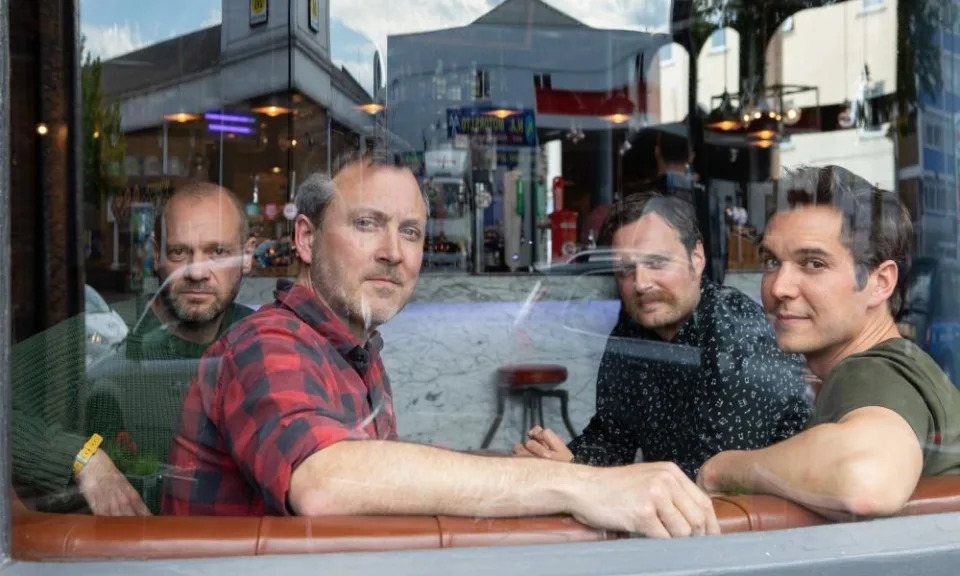
Led By Donkeys activists, from left, Ben Stewart, Oliver Knowles, Will Rose and James Sadri in a north London pub in 2019. Photograph: Andy Hall/The Observer
Led by Donkeys was established in 2018 as a campaign in response to Brexit. Its high-profile projects and satirical stunts have since included a spoof episode of the BBC show Line of Duty with Boris Johnson being interrogated by the anti-corruption AC-12 unit and painting the colours of the Ukrainian flag outside the Russian embassy in London.
A spokesperson for Hancock said: “The accusation appears to be that Matt acted entirely properly and within the rules, which had just been unanimously adopted by parliament. It’s absurd to bring Mr Hancock into this story through the illegal publication of a private conversation. All the video shows is Matt acting completely properly.”
Brady said he was leaving parliament at the next election and had received a number of approaches concerning future opportunities, including the purported South Korean firm. He said: “I made it clear that any arrangement would have to be completely transparent and that, whilst a member of parliament, I would only act within the terms of the code of conduct. I also made it clear that while I could be flexible in attending international meetings in person, this would be subject to some important votes or commitments in Westminster.”
He said that, with regard to advice on approaching figures in government, he made clear he would always follow the rules. He said he was interviewed prior to a stricter code of conduct being introduced on 1 March.
He said he did “some internet research” on the firm but, given it was an exploratory conversation, considered it reasonable to proceed. He said he did not consider he was “doing business” in his parliamentary office and it was not a bad thing for MPs to have outside interests, providing they followed the rules.
Hammond said: “This was nothing other than what I thought to be a preliminary discussion with a South Korean company – a country that is close to my heart as I have a substantial Korean community in my constituency, and which is an important ally to the UK. It turns out this company was fake, with a fake website. The remuneration amount was suggested by the actor purporting to be an employee of the company, not by me. Scamming is an unpleasant activity undertaken with malicious intent. I believe it is a great honour to be an MP. I have always put my constituents first and will always try to act in their best interests.”
Kwarteng did not respond to a request for comment.
AFP
Fri, 24 March 2023
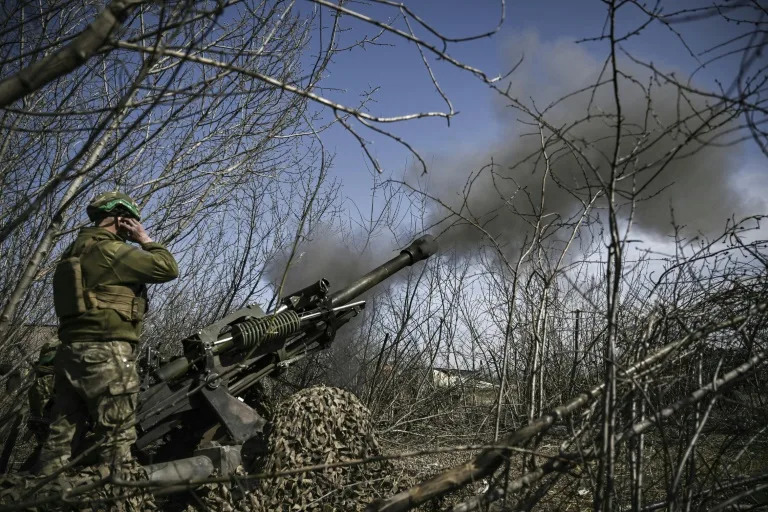
The United Nations said Friday it was "deeply concerned" by what it said were summary executions of prisoners of war by both Russian and Ukrainian forces on the battlefield.
The allegations came shortly after Kyiv accused Russian forces of killing a captured Ukrainian serviceman who was filmed saying "Glory to Ukraine" before being shot dead.
The head of the UN Human Rights Monitoring Mission in Ukraine, Matilda Bogner, said that her organisation had recently recorded killings by both sides.
"We are deeply concerned about (the) summary execution of up to 25 Russian prisoners of war and persons hors de combat by the Ukrainian armed forces, which we have documented," Bogner said at a press conference in Kyiv on Friday.
"This was often perpetrated immediately upon capture on the battlefield," she said.
"While we are aware of ongoing investigations by Ukraine authorities into five cases involving 22 victims, we are not aware of any prosecution of the perpetrators," she added.
Bogner also expressed "deep" concern over the alleged executions of 15 Ukrainian prisoners by Russian armed forces after their capture.
She said the Wagner mercenary group, which claims to be leading Russia's assault for Bakhmut -- the longest and bloodiest battle of the war -- was responsible for 11 of those killings.
Moscow and Kyiv have accused each other of mistreating prisoners of war since Russian President Vladimir Putin invaded a year ago.
In response to the UN report, Kyiv's Ministry of Foreign Affairs said it was "unacceptable" to hold the "victim of aggression" responsible.
- 'They broke us' -
One UN report issued Friday claimed Ukrainian military personnel had subjected prisoners of war to death threats, mock executions or threats of sexual violence. Some beatings were "purely retaliatory", it said.
"In some cases, officers beat POWs saying: 'This is for Bucha'," the mission reported detainees as saying, referring to a town near Kyiv where Russian forces were accused of widespread atrocities.
"Before questioning, they showed me an axe handle covered in blood as a warning," the report quoted a Russian POW as saying.
"The questioning lasted for about an hour and they used electricity six times, whenever they thought I was lying," the detainee said, according to the report.
Ukrainian POWs quoted in the report said they were subjected to torture, sexual violence, a lack of food and water and denied medical attention.
They said they were tortured and ill-treated to extract information or as a form of punishment, the mission said.
Ukrainian prisoners reported being beaten with shovels, stabbed, subjected to electric shocks and strangled.
"Some of them lost their teeth or fingers, had their ribs, fingers or noses broken," the report said.
"They did not just beat us, they broke us. They used their fists, legs, batons, tasers. There were POWs who had their arms or legs broken," one man was quoted as saying.
The Ukrainian parliament's human rights commissioner Dmytro Lubinets said Friday that he was "surprised" by the allegations against Ukrainian troops and said he had not been informed of them in advance.
On Telegram, he wrote that he wanted to "know the facts and the indisputable arguments on which the conclusions" of the UN report were based.
In a separate statement on Friday, Kyiv's Ministry of Foreign Affairs thanked the UN monitors for their work but emphasised that Ukraine "expects that the UN mission will avoid any steps that may be interpreted as equalising the victim and the aggressor".
bur/imm/lcm/fb/lb/cwl
Alia Shoaib
Sat, 25 March 2023
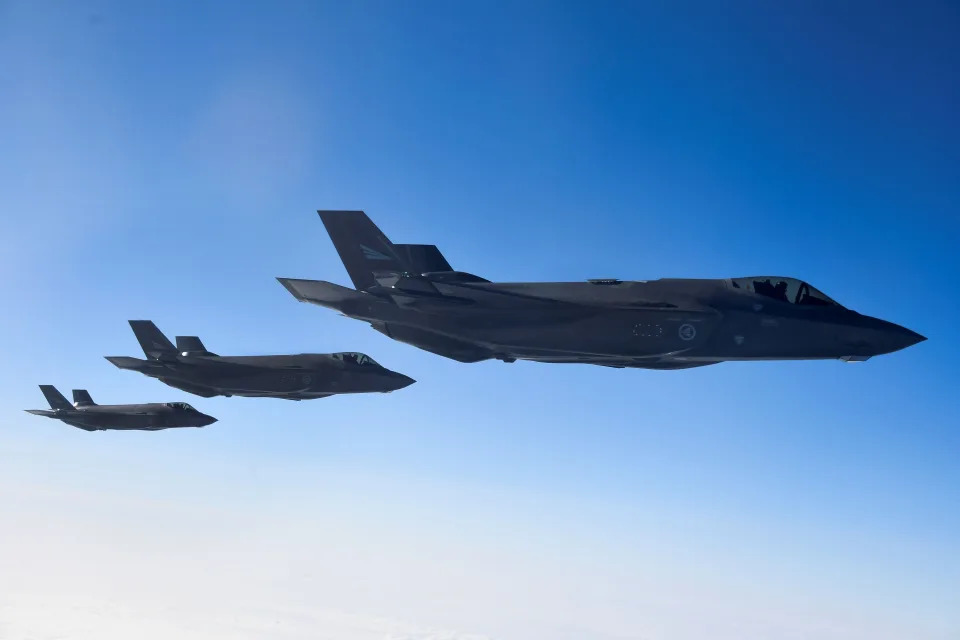
Norwegian F-35 fighter jets pictured over Norway on March 22, 2022
The four Nordic countries agreed to operate their roughly 250 fighter jets in one fleet.
Sweden, Norway, Finland and Denmark, have modern air forces that include F-35s.
They joined forces hoping to deter Russia.
The air forces of four Nordic countries agreed to operate their fleets of around 250 fighter jets as a combined force, hoping to deter Russia by working together.
Air force commanders of Sweden, Norway, Finland and Denmark said Friday that they have signed a letter of intent to establish a unified Nordic air defense, Reuters reported.
"The ultimate goal is to be able to operate seamlessly together as one force by developing a Nordic concept for joint air operations based on already known NATO methodology," Denmark's air force said in a statement, per Bloomberg.
"Our combined fleet can be compared to a large European country," commander of the Danish air force, Major General Jan Dam, told Reuters.
Dam said the move was in response to Russia's invasion of Ukraine last year. The invasion also prompted Sweden and Finland to seek entry into NATO, an alliance which already includes Denmark and Norway.
The joint force will be a worry for Russia, boasting a significant number of top-tier fighter jets.
Norway, Denmark, and Finland have all committed to the F-35 jets which are the most advanced Western fighter planes. Norway operates some already, while Finland and Denmark are due to receive them in the coming years.
Sweden has its own model of fighter jet, the Gripen C and D, with modernized Gripen E planes on order.
NATO Air Command chief General James Hecker was also present at the signing of the letter at Ramstein Air Force Base in Germany.
Sweden and Finland applied to join NATO in May 2022, jolted by Russia's invasion of Ukraine into ending decades of their position of "non-alignment."
Their applications have been held up by Turkey and Hungary, who are yet to ratify the memberships.
One of the many reasons cited by Russian President Vladimir Putin as justification for his invasion of Ukraine has been NATO's enlargement since the Cold War.
However, Russia's war in Ukraine led to further expansion of the alliance, and increased co-operation and defense spending by its members.
James Kilner
Sat, 25 March 2023
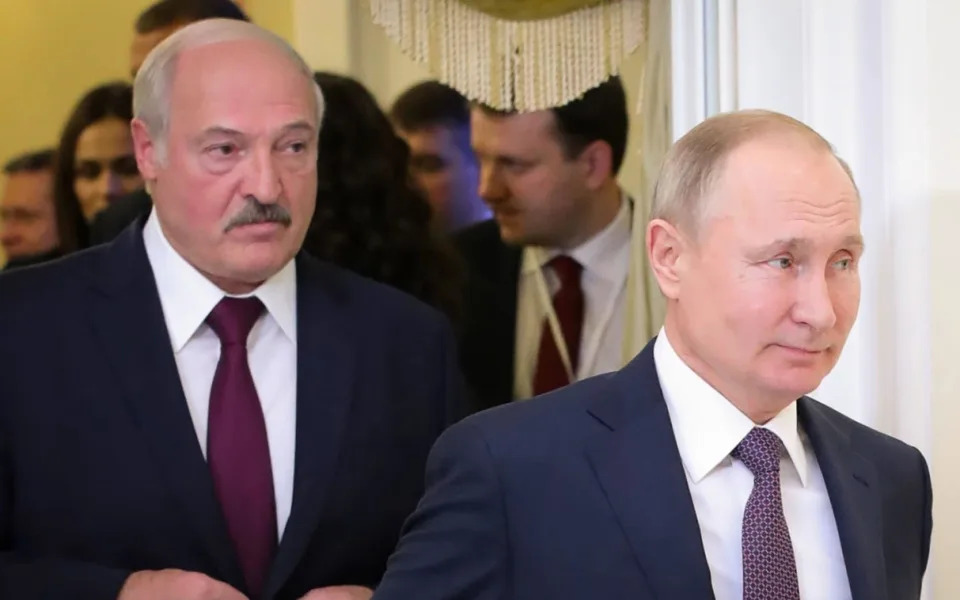
Alexander Lukashenko, the Belarusian president, is a staunch supporter of Vladimir Putin - AFP
Vladimir Putin has announced plans to station tactical nuclear weapons in Belarus for the first time, shifting his most destructive weapons closer to Europe and Kyiv.
The move represents the first time Russia will store part of its nuclear arsenal in another country since the breakup of the Soviet Union.
"We agreed with Lukashenko that we would place tactical nuclear weapons in Belarus without violating the nonproliferation regime,” he said in an interview for Russian TV broadcast on Saturday evening.
Mr Putin went on to suggest that his announcement was in response to news that Britain was sending depleted uranium shells to Ukraine with its Challenger-2 tanks.
"Russia has its own answer to ammunition with depleted uranium. We have similar weapons, but the Russian Federation has not yet used them,” he said.
Experts insist however that depleted uranium is standard use in British armour-piercing shells and holds no nuclear value.
Responding to Russia’s concerns around depleted uranium earlier in the week, the British ministry of defence said: “The British Army has used depleted uranium in its armour piercing shells for decades. It is a standard component and has nothing to do with nuclear weapons or capabilities. Russia knows this, but is deliberately trying to disinform.”
Belarusian president Alexander Lukashenko is a staunch supporter of Mr Putin and allowed Russia to use Belarus as a launchpad for its invasion of Ukraine.
He has resisted Mr Putin’s pressure to directly enter the war but has allowed Russian warplanes to use Belarusian airspace to fire missiles at Ukrainian targets.
Last year, the Russian military upgraded Belarus’ air force so that it was capable of firing missiles with nuclear warheads and in February, Belarus’ military said that it had taken delivery of Iskander missile launchers from Russia which are capable of firing nuclear-tipped missiles.
Mr Putin said that he wasn’t breaking any international treaties because we are “doing what the US has been doing for decades”.
“We agreed that we will do the same, without violating our obligations,” he said.
The US stations nuclear missiles in Belgium, Germany, Italy, the Netherlands and Turkey.
Earlier this year, Russia pulled out of the Start Nuclear Treaty, the last remaining treaty with the US aimed at stopping a nuclear arms proliferation.
Mr Putin said that the storage facility to house tactical nuclear weapons would be completed by July and that Russia would remain in control of the weapons.
Russia is already suspected of stationing nuclear weapons in its European exclave of Kaliningrad, wedged between Poland, Lithuania and the Baltic Sea. It has also developed a missile called Satan-2 that can fire a nuclear warhead at any city in the world within minutes of being launched from Russia.
Kremlin officials threatened Russia’s enemies with nuclear strikes last year, although US intelligence has said that this threat has receded.
When the Soviet Union broke up in 1991 it left parts of its nuclear arsenal in Ukraine, Belarus and Kazakhstan. A deal signed in 1992 meant that by 1996, former Soviet nuclear weapons outside Russia had either been destroyed or transferred back to Russia.
Mr Putin also used his TV interview to back up claims that either Ukrainian or US special forces blew up the Nord Stream oil gas pipeline in the Baltic Sea last year.
Initially, Western intelligence agencies had blamed Russia for blowing up the pipeline.
Earlier this week, Mr Putin hosted Chinese president Xi Jinping in Moscow, giving himself a major boost on the world stage, although he said that discussions about a Chinese peace plan for the war in Ukraine were only a part of their talks.
“The main focus of the talks was on the economy,” he said in his TV interview.
Meet the motley crew of anarchists and anti-fascists fighting Russia in Ukraine
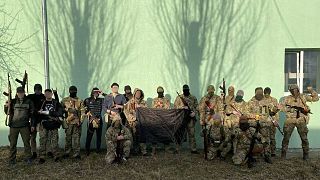
“In a world where rulers use all kinds of manipulation, compulsion and violence to wage bloody wars for their own interests, organised people must confront them with force.”
These are the incandescent words of Ilya, a self-styled Ukrainian anarchist.
He is part of a motley crew of "anarchists, anti-fascists and football hooligans", who say they have united under the black flag -- a key symbol of anarchism -- to help Ukraine defend itself from Russian aggression.
Although “security concerns” prevent them from sharing too much about their identity, their self-styled “anti-authoritarian” platoon numbers several dozen, with volunteers coming from all around the world.
"For us, this invasion reflects the imperialist policies of Putin's regime,” Ilya told Euronews. “It is clear that the Kremlin’s propaganda about 'fighting Nazis in Ukraine' is just a smoke screen to disguise greed for power and the desire to establish harsh authoritarian rule.”
 The squad are participating in the territorial defence of UkraineBlack Head Quarters - Telegram
The squad are participating in the territorial defence of UkraineBlack Head Quarters - TelegramIlya’s anti-authoritarian platoon is part of Ukraine's Territorial Defence Forces (TDF), a volunteer military reserve formed after Russia's 2014 invasion of Crimea.
In keeping with the anarchist tradition of rejecting the state, Ilya said their platoon was not fighting for the Ukrainian government, but for Ukrainian society “which is the main resistance against this brutal aggression”.
"Both for the sake of justice and the basic survival of Ukrainian society this invasion should be fought boldly and defeated completely,” he said. “Society here is under deadly attack – it should defend itself."
‘What does Putin’s regime bring them?'
Even if Ukraine is at war with Russia, the anti-authoritarian platoon says they do not consider Russians as enemies.
In a manifesto published by the Resistance Committee, which helps coordinate the anti-authoritarian resistance in Ukraine, Russians -- and Belarusians -- were called upon to join the war.
"Until the nest of tyranny in Moscow is removed, the whole region will constantly face harassment against its freedom,” the manifesto reads. “Every local tyrant, suppressing his rebellious people, will be assisted by the tsar of Moscow.
“We want to set ourselves and our neighbours free,” it added. “The struggle of Ukrainians gives hope for liberation to everyone oppressed by Putinism.”
In recent years, Moscow helped suppress protests in both Belarus and Kazakhstan against the country’s leaders, arguing intervention was necessary to maintain order.
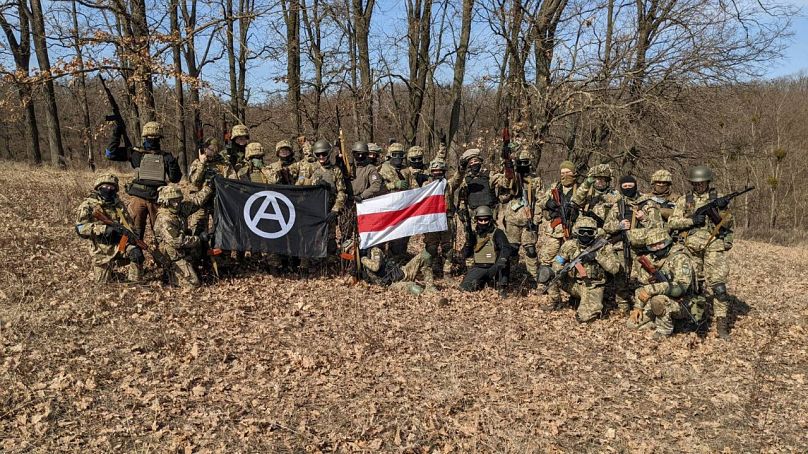
Much attention has been paid to the alleged role of the far-right within the Ukrainian armed forces, particularly surrounding the Azov Regiment, as well as neo-Nazis in Russia’s military.
The myth far-right zealots run Ukraine is Russian propaganda | View
But this group of soldiers, who have loosely aligned under the flag of anarchism, are unique to the Ukrainian side.
They are the latest incarnation of a small anarchist movement which has fought for their political ideals in a foreign war, following the International Brigades in the Spanish Civil War (1936 - 39) and those fighting with the Kurdish YPG in Syria.
‘The epicentre of Ukrainian resistance is here’
Spared the frontline so far, the platoon has provided territorial defence in the central regions of Ukraine, patrolling to “detect and root out enemy infiltrators”.
They have also assisted those on the battlefield logistically and with intelligence, which they say has led to the “destruction” of enemy targets.
The platoon has also helped evacuate civilians from combat areas, often coming under mortar fire in the process.
Inside their unit, the fighters try to live out their politics, with a more democratic culture of free discussion and critique. Deputy commanders are elected for each section, while regular meetings allow fighters to relay feedback.

Ilya hoped that the existence of their platoon would contest the allegations surrounding the far-right in Ukraine.
“The myth about the far-right dominating Ukrainian politics relies partly on very huge, well-financed and active propaganda by the Kremlin and partly on the actual, visible presence of the far-right in Ukraine,” says Ilya.
“But statements that the far-right shape Ukrainian politics, society or army are simply not true,” he added.
Moscow has repeatedly said its "special military operation" is to disarm and "denazify" its neighbour.
Ukraine and its allies call this a baseless pretext for a war that has killed thousands, flattened cities and forced millions of people to flee.
‘We were ready’
The platoon formed on 24 February, the very first day of the war.
"Of course, it did not start life from scratch," said Ilya. “Hearing rumours about the coming war, anarchists in Kyiv began planning what to do should our fears come true.” They contacted their "comrades" in the TDF, began training together and plotted how to find one another should something start.
Shortly after, it did.
The “source and root of the platoon are the anti-fascist struggle,” says Ilya. Before the war, practically all of the fighters were environmental activists, in trade unions or part of Antifa, a radical left wing group.
Many had also fought in Syria with the Kurdish YPG.
'We need more democracy, more diversity, more ideas'
Faced with the challenges of war, many in the platoon are pursuing far-reaching goals, although they are far from united on what they should be.
In their manifesto, the platoon outlines some of the changes they want to see in Ukraine, including the cancellation of the country’s international debt and a credit amnesty for those inside the country.
Debt is a “noose around the country’s neck held by international financial institutions and wealthy states,” reads the document.
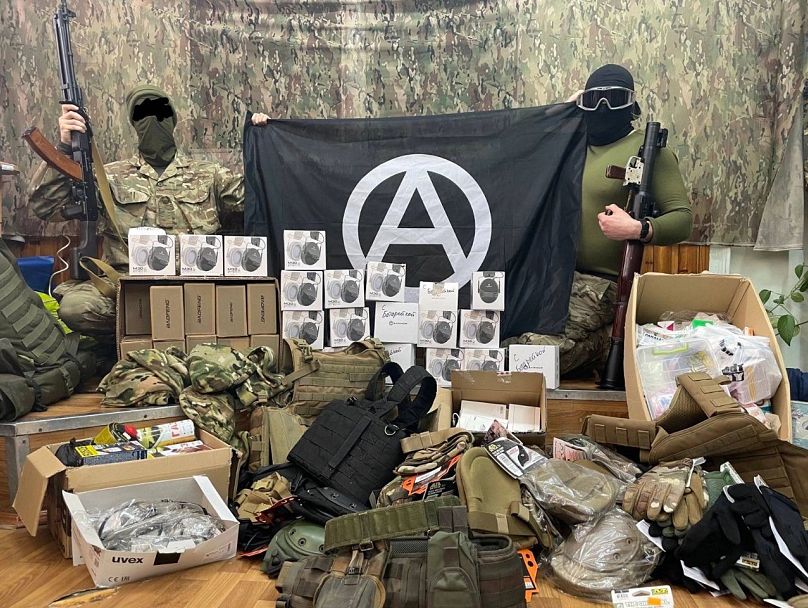 Volunteer fights pose with new equipment donated to their platoon Black Head Quarters -
Volunteer fights pose with new equipment donated to their platoon Black Head Quarters -Since the outbreak of the war in 2014, international financial institutions such as the International Monetary Fund, World Bank and European Commission, have lent Ukraine some $40 billion (€37.4 billion).
This money, they say, has been necessary to keep Ukraine’s economy afloat and finance its war effort.
If they are to achieve their objectives both on and off the battlefield, the platoon says it needs more support from around the world.
"Solidarity plays a super important role,'' says Ilya. “Everyone speaks about the urgent importance of supplying weapons from aboard. But I would also stress the moral importance of solidarity from people worldwide against injustice and occupation."